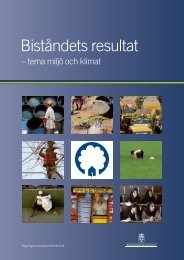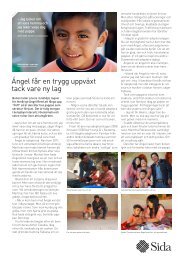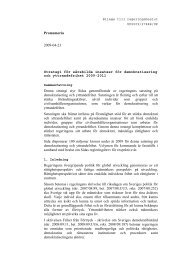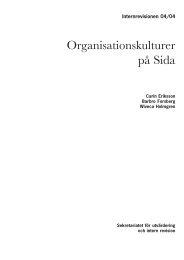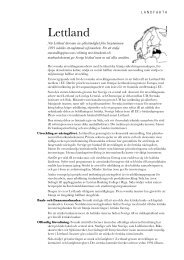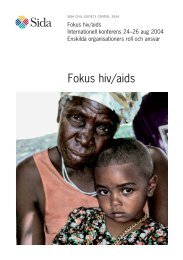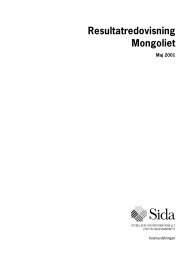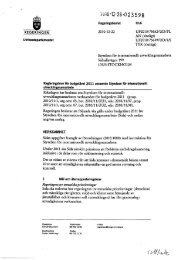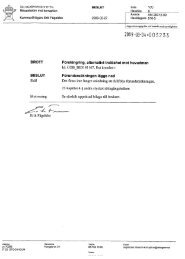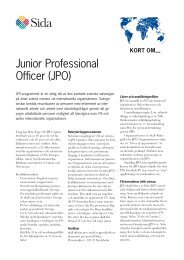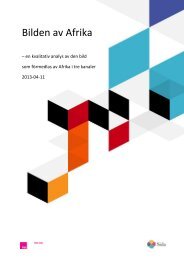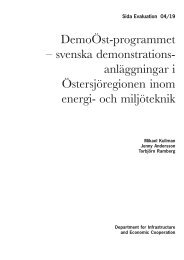Mid-Term Review of the AGIR Programme - Sida
Mid-Term Review of the AGIR Programme - Sida
Mid-Term Review of the AGIR Programme - Sida
You also want an ePaper? Increase the reach of your titles
YUMPU automatically turns print PDFs into web optimized ePapers that Google loves.
2 F I N D I N G S<br />
ronment and <strong>the</strong> <strong>of</strong>ten-weaker internal capacity <strong>of</strong> <strong>the</strong>se local level organisations, this<br />
vertical approach to capacity development can potentially be inefficient. This is especially<br />
true if <strong>the</strong>se organisations do not have strong internal governance structures and<br />
processes that can ensure an adequate distribution <strong>of</strong> resources at all levels. Many<br />
organisations allocate only a small part <strong>of</strong> <strong>the</strong>ir annual budget to <strong>the</strong> provinces. In <strong>the</strong><br />
case <strong>of</strong> Diakonia, <strong>the</strong> allocation <strong>of</strong> funds to <strong>the</strong> local level ranges from 3% to 40%,<br />
with an average <strong>of</strong> 12.6%. In <strong>the</strong> particular case <strong>of</strong> networks, <strong>the</strong> centralised approach<br />
to <strong>the</strong> allocation <strong>of</strong> resources is putting an additional burden on local representatives,<br />
which are using <strong>the</strong>ir own resources to keep <strong>the</strong> network operational.<br />
Recently, <strong>the</strong> pattern <strong>of</strong> recruitment for new CSO partners has changed to include<br />
more young and youth-based CSO partners. While <strong>the</strong> intake <strong>of</strong> more ‘locally’ based<br />
direct partners contributes to a process <strong>of</strong> streng<strong>the</strong>ning a generally weak local civil<br />
society, <strong>the</strong>re is a particular need to actively support <strong>the</strong> organisations that are far<br />
from <strong>the</strong> main financial center(s), helping to diversify <strong>the</strong>ir donor portfolio as well as<br />
helping to lobby for common funding arrangements.<br />
Similarly, <strong>AGIR</strong> intermediaries were asked if <strong>the</strong>y had a plan for <strong>the</strong> ‘graduation’ <strong>of</strong><br />
CSO partners who have streng<strong>the</strong>ned <strong>the</strong>ir capacity to a point deemed sustainable by<br />
<strong>the</strong> programme (meaning survival without programme support). At some point <strong>the</strong>re<br />
has to be a limit to <strong>the</strong> number <strong>of</strong> <strong>AGIR</strong> CSO partners that can be supported by <strong>the</strong><br />
intermediaries, a limit based on <strong>the</strong> capacity <strong>of</strong> <strong>the</strong> intermediary to directly and fully<br />
support each CSO as envisioned within <strong>the</strong> programme planning. While intermediaries<br />
commented that <strong>the</strong>y did have limits to <strong>the</strong> amount <strong>of</strong> CSOs with whom <strong>the</strong>y<br />
could work, this limit was based more on financial restrictions than on intermediary<br />
capacity support limitations. If <strong>the</strong> programme is to grow (ei<strong>the</strong>r with more donors<br />
and/or additional intermediaries) how and when CSOs move from nursery to core<br />
status and finally, to graduate out <strong>of</strong> <strong>the</strong> programme is important to <strong>the</strong> overall programme<br />
<strong>the</strong>ory <strong>of</strong> change and to <strong>the</strong> sustainability <strong>of</strong> <strong>the</strong> programme. The concept <strong>of</strong><br />
‘graduation’, where CSOs who have been within <strong>the</strong> programme for a number <strong>of</strong><br />
years and have had <strong>the</strong>ir organisational capacity streng<strong>the</strong>ned (internal and external)<br />
before being moved out <strong>of</strong> <strong>the</strong> programme, was a topic <strong>of</strong> interest for all <strong>of</strong> <strong>the</strong> external<br />
voices spoken to, although none had any plans for this process in <strong>the</strong>ir own programmes.<br />
<strong>AGIR</strong> should consider taking a position on this process and should put in<br />
place mechanisms, such as small grants, that help CSOs that leave <strong>the</strong> programme to<br />
continue to function. This <strong>the</strong>n frees up space for new emerging CSOs to assume a<br />
position in <strong>the</strong> programme.<br />
Ano<strong>the</strong>r concern relates to <strong>the</strong> balance between <strong>the</strong> basic requirements <strong>of</strong> internal democracy<br />
and transparency <strong>of</strong> CSO partners while maintaining openness to support<br />
looser organised networks and initiatives. It has been mentioned in discussions with<br />
intermediaries that a strong focus on requiring partners to fit one ‘mode for all’ might<br />
negatively affect <strong>the</strong>ir initiative and creativity. In this context, one <strong>of</strong> <strong>the</strong> intermediaries<br />
has expressed openness to <strong>the</strong> stimulation <strong>of</strong> loose regional CSO networks by<br />
<strong>AGIR</strong>.<br />
68




